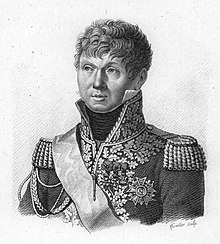Claude Perrin
|
Marshal of the Empire Claude Victor-Perrin |
|
|---|---|

Claude Victor-Perrin, Marshal of France
|
|
| Born |
7 December 1764 Lamarche, France |
| Died | 1 March 1841 (aged 76) Paris, France |
| Buried | Père Lachaise Cemetery, Paris, France |
| Allegiance |
|
| Rank | Marshal of France |
| Battles/wars | French Revolutionary Wars, Napoleonic Wars, Hundred Days |
| Awards | First Duc de Belluno |
Claude Victor-Perrin, First Duc de Belluno (7 December 1764 – 1 March 1841) was a French soldier and military commander during the French Revolutionary and Napoleonic Wars. He was made a Marshal of France in 1807 by Napoleon.
He was born at Lamarche in the Vosges, son of Charles Perrin and wife Marie Anne Floriot, paternal grandson of Charles Perrin and wife Gabrielle Guerin, born in 1696, and great-grandson of Pierre Perrin and wife Anne Louvière. In 1781 he entered the army as a private soldier, and after ten years' service he received his discharge and settled at Valence. Soon afterwards he joined the local volunteers, and distinguishing himself in the war on the Alpine frontier, in less than a year he had risen to the command of a battalion. In Drôme, Valence, on 16 May 1791 he married Jeanne Josephine Muguet, by whom he had issue which was extinct in the male line by 1917.
For his bravery at the siege of Toulon in 1793 he was raised to the rank of général de brigade. He afterwards served for some time with the army of the Eastern Pyrenees, and in the Italian campaign of 1796–1799 he so acquitted himself at Mondovì, Rovereto and Mantua that he was promoted to be general of the division.
After commanding for some time the forces in the department of Vendée, he was again deployed to Italy, where he performed well in service against the papal troops, and took an important part in the battle of Marengo. In 1802 he was made governor of the colony of Louisiana for a short time, in 1803 he commanded the Batavian army, and afterwards he acted for eighteen months (1805–1806) as French plenipotentiary at Copenhagen. In that year he married for a second time in June at 's-Hertogenbosch to Julie Vosch van Avesaat (1781–1831), by whom he had an only daughter who died unmarried and without issue.
...
Wikipedia
